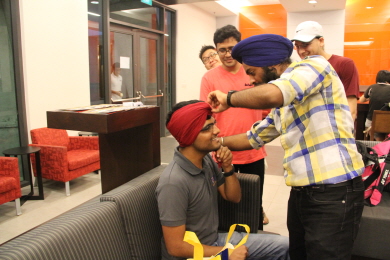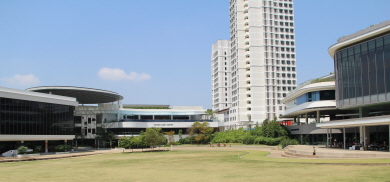

Celebrating Chinese New Year and Valentine’s Day, a decoration for these holidays were easily seen inside the University Town. Starting from the dining hall inside the College of Alice & Peter Tan building, the festive atmosphere continued to the Utown Residence (UTR) where graduates and exchange students stay.
“We get to decorate our halls by ourselves,” said Alison Koh (NUS, 2) who is participating in a residential college program, the College of Alice & Peter Tan. “Since Valentine’s Day is coming, we decorated our halls with heart.”
Looking around the University town, as if it is a one-stop place for student activities, most facilities starting from deepening students’ fields of interest to even cooking for roommate’s birthday are prepared.
“University Town is a place where you can do pretty much anything,” said Pauline Luk (NUS, PhD) who is a Resident Assistant at Utown Residence. “From doing assignments at lab commons where you can use computers to enjoying programs, everything can be done here.”
Walking down from the bus station, the light at the research hubs in collaboration with MIT is still bright at night. In front of the building, a digital promotion board signaling tonight’s event for Cultural Activities Club’s concert is pointing at “D-day.”
At a wide lawn called “Town Green,” students play ball games and play guitar singing with friends. Across the green field, a learning cafe operating 24 hours is filled with students studying.
“It is really easy to find a place to study here,” said Shin Dong-hee (NUS, 1), a full-time Korean international student. “There are even electric outlets under every table at the Learning cafe.”
Across the verdant field, a sound rings out from the Utown Residence welcoming students for the “UTR Cultural Pavilion.” From learning how to write Chinese calligraphy or tie a turban to how to make roses for the Valentine’s decoration, and getting Henna tattoos, NUS offers diverse cultural experiences.
“It is interesting to participate in these events, which is possible thanks to the merit of NUS’s globalized student backgrounds.” said Liu Shunshun (NUS, 4), who is a Chinese international student.

